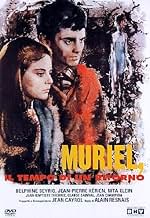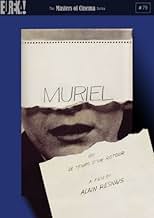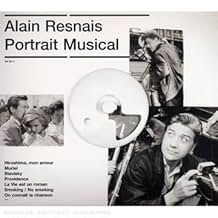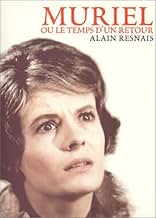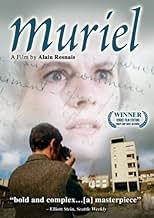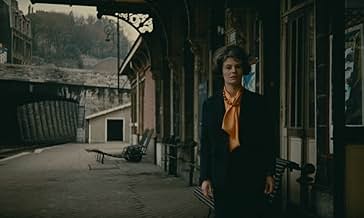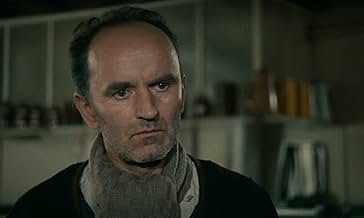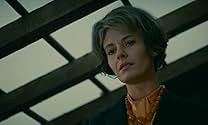VALUTAZIONE IMDb
7,0/10
4009
LA TUA VALUTAZIONE
Nella cittadina balneare di Boulogne, nessuno sembra in grado di affrontare il proprio passato, meno che meno Hélène, una commessa di mobili antichi, il figliastro Bernard e il suo ex amante... Leggi tuttoNella cittadina balneare di Boulogne, nessuno sembra in grado di affrontare il proprio passato, meno che meno Hélène, una commessa di mobili antichi, il figliastro Bernard e il suo ex amante Alphonse.Nella cittadina balneare di Boulogne, nessuno sembra in grado di affrontare il proprio passato, meno che meno Hélène, una commessa di mobili antichi, il figliastro Bernard e il suo ex amante Alphonse.
- Regia
- Sceneggiatura
- Star
- Premi
- 3 vittorie e 3 candidature totali
Jean-Baptiste Thiérrée
- Bernard Aughain
- (as Jean-Baptiste Thierrée)
Wanda Kerien
- La cliente
- (as Wanda Kérien)
Recensioni in evidenza
"Muriel" (1963) directed by Alain Resnais is a drama about the persistence of memory (aren't all Resnains' films? Incidentally, I named my review of "Hiroshima Mon Amour" that I saw about two years ago, "Persistence of Memory".)
Muriel of the title is dead by the time the movie begins, the victim of torture by the French soldiers during the occupation of Algeria. One of the soldiers, Bernard, is back in France living with his step-mother, Helene (Delphine Seyrig) in the province city Boulogne and hunted by the memories of war and Muriel. Helen deals with her own past and memories of Alphonse (Jean-Pierre Kérien), an ex-lover who comes from Paris to visit her in the company of his new 20-years-old girlfriend, Françoise (Nita Klein)
The story which Resnais tells is simple and the trailer for the movie gives a viewer a very good idea of what they are about to see: The Past. The present. The future - is it possible? Uncertainty. Suspicions. Lies. Four main characters, Helene, Alphonse, Bertrand, and Françoise are in search of what they are. There will be secrets and confessions. Is that time to love? The main theme of the film is reality vs. memory of it. Can we always trust ourselves with what we remember? Does our memory reflect the events the way they really happened or our vision of them is altered as time passes and new realities inevitably enter our lives?
What makes "Muriel" unique after all these years is the way the director presents the journey into the past of his characters, how they see it, and how it affects their present lives and the possibility (or rather impossibility) of love and happiness. Alain Resnains uses quick flashes of memory in the form of almost hypnotizing jump cuts of his genius cinematographer Sacha Vierny (Resnains and Vierny had made 10 films together). Vierny provided beautiful melancholic visual palette of washed out colors that created the atmosphere of unbearable sadness, loss, and hopelessness. Vierny who always underlined his preference for atmosphere over formal perfection, had said, "My satisfaction is that the photography is not remarked on too much for itself". The visual originality and innovation are accompanied by unusual unnerving soundtrack, eerie and haunting that adds to the understanding of guilt and remorse the film characters live with.
"Muriel" is a puzzling and multi-layered film that is easy to admire and meditate on. It is not entertaining or heart-warming and it is hard to identify with its heroes (or anti-heroes) but is always fascinating and rewarding and it may reveal its secrets after multiple viewings.
Muriel of the title is dead by the time the movie begins, the victim of torture by the French soldiers during the occupation of Algeria. One of the soldiers, Bernard, is back in France living with his step-mother, Helene (Delphine Seyrig) in the province city Boulogne and hunted by the memories of war and Muriel. Helen deals with her own past and memories of Alphonse (Jean-Pierre Kérien), an ex-lover who comes from Paris to visit her in the company of his new 20-years-old girlfriend, Françoise (Nita Klein)
The story which Resnais tells is simple and the trailer for the movie gives a viewer a very good idea of what they are about to see: The Past. The present. The future - is it possible? Uncertainty. Suspicions. Lies. Four main characters, Helene, Alphonse, Bertrand, and Françoise are in search of what they are. There will be secrets and confessions. Is that time to love? The main theme of the film is reality vs. memory of it. Can we always trust ourselves with what we remember? Does our memory reflect the events the way they really happened or our vision of them is altered as time passes and new realities inevitably enter our lives?
What makes "Muriel" unique after all these years is the way the director presents the journey into the past of his characters, how they see it, and how it affects their present lives and the possibility (or rather impossibility) of love and happiness. Alain Resnains uses quick flashes of memory in the form of almost hypnotizing jump cuts of his genius cinematographer Sacha Vierny (Resnains and Vierny had made 10 films together). Vierny provided beautiful melancholic visual palette of washed out colors that created the atmosphere of unbearable sadness, loss, and hopelessness. Vierny who always underlined his preference for atmosphere over formal perfection, had said, "My satisfaction is that the photography is not remarked on too much for itself". The visual originality and innovation are accompanied by unusual unnerving soundtrack, eerie and haunting that adds to the understanding of guilt and remorse the film characters live with.
"Muriel" is a puzzling and multi-layered film that is easy to admire and meditate on. It is not entertaining or heart-warming and it is hard to identify with its heroes (or anti-heroes) but is always fascinating and rewarding and it may reveal its secrets after multiple viewings.
Muriel is a riddle. It may just have been the first art-house movie I ever saw. It was on local TV one day when I was about 18 maybe and I left it on because I was studying French and had been told to watch French movies. I found myself amazed and dumbfounded by the jump-cuts and seeming lack of continuity between scenes.
Today, 12 years later or so I've finally seen the whole thing and I feel like I saw a completely different movie to the one I saw last time. I feel I understand who the characters are, what the central mystery is, but I understand very little of the minute by minute goings on of where characters are moving and why. I feel this is a film that intentionally tries to disorient you constantly. Just as you are becoming comfortable in a scene, it will switch completely and never return. It reminds me of a perfectly normal film about four characters and their interrelations that has been sliced up and then recreated anew in the editing room. The characters make reference to dreams and memory, but on this viewing I didn't see it as necessarily a recreation of those things, but as a depiction of disorientation.
I found the newsreel section in the middle, which I don't at all remember seeing 12 years ago, particularly important addition, and the whole thing is just as refreshing as it ever was.
Today, 12 years later or so I've finally seen the whole thing and I feel like I saw a completely different movie to the one I saw last time. I feel I understand who the characters are, what the central mystery is, but I understand very little of the minute by minute goings on of where characters are moving and why. I feel this is a film that intentionally tries to disorient you constantly. Just as you are becoming comfortable in a scene, it will switch completely and never return. It reminds me of a perfectly normal film about four characters and their interrelations that has been sliced up and then recreated anew in the editing room. The characters make reference to dreams and memory, but on this viewing I didn't see it as necessarily a recreation of those things, but as a depiction of disorientation.
I found the newsreel section in the middle, which I don't at all remember seeing 12 years ago, particularly important addition, and the whole thing is just as refreshing as it ever was.
Slow burn relationship drama, an old relationship renewed and examining current relationships; lovers, family... The title of the film itself seems a play on words as it's less a take-your-pick affair than it is saying the film is about these two things, connected but because the characters share connections in the present day.
Here again we see Resnais exploring themes of time and memory as was the case with his previous two feature films: Last Year At Marienbad and Hiroshima Mon Amour. This, his third feature, reflects on times past, the characters talk about the past, but it doesn't go into filmed flashbacks or creative revisiting, looping back on itself, adding or changing subtle details. Memory does also come into play. With the one side of the two stories it's two characters with a shared past, of which one asks why this, how come, what were you thinking then...the other attempts to answer. But it remains elusive, a story told in pieces. Hard to assimilate as we aren't really shown enough connect-the-dot details of a shared past so much as we are just shown they had a shared past and make of it what you will. This approach can wear thin...it lacks cohesion and as a consequence comes up short on dramatic tension. The other part of the story also looks to the past, also fragmented and elusive.
Early on the sound score, arriving at specific points, provides more than emphasis or support as it temporarily lends an air of mystery or sly menace that wouldn't necessarily be noticed at all otherwise. Neat trick in the way it suggests unsettled feelings or hints at perhaps darker revelations to come, something I didn't get from the dialogue alone. It too is another piece. There is other symbolism to be found, a gun shown disassembled, in pieces...
At a couple points the film goes into quick edits. A single line of dialogue, jump to another scene and another line. On and on. More little pieces. It may have seemed a clever film editing technique at the time but the dialogue as presented is disconnected, unfocusing the passage of time with muddled glimpses. Which may have been the point but more than anything I found it to be somewhat annoying.
Enough. The film is an exercise in patience. For me, too much so because, even though it comes to some conclusions, in the end I didn't feel it was enough to justify the scattered approach of uncertain reflections and eventual points made. Even though from the same time period, I don't feel this film is in the same class as the Resnais films Marienbad and Hiroshima, two films that are masterpieces or nearly so. You could say the approach with Muriel is radical, as was the case in those two previous films, but that doesn't, in and of itself, make it a great film. In my opinion, yours may differ.
Here again we see Resnais exploring themes of time and memory as was the case with his previous two feature films: Last Year At Marienbad and Hiroshima Mon Amour. This, his third feature, reflects on times past, the characters talk about the past, but it doesn't go into filmed flashbacks or creative revisiting, looping back on itself, adding or changing subtle details. Memory does also come into play. With the one side of the two stories it's two characters with a shared past, of which one asks why this, how come, what were you thinking then...the other attempts to answer. But it remains elusive, a story told in pieces. Hard to assimilate as we aren't really shown enough connect-the-dot details of a shared past so much as we are just shown they had a shared past and make of it what you will. This approach can wear thin...it lacks cohesion and as a consequence comes up short on dramatic tension. The other part of the story also looks to the past, also fragmented and elusive.
Early on the sound score, arriving at specific points, provides more than emphasis or support as it temporarily lends an air of mystery or sly menace that wouldn't necessarily be noticed at all otherwise. Neat trick in the way it suggests unsettled feelings or hints at perhaps darker revelations to come, something I didn't get from the dialogue alone. It too is another piece. There is other symbolism to be found, a gun shown disassembled, in pieces...
At a couple points the film goes into quick edits. A single line of dialogue, jump to another scene and another line. On and on. More little pieces. It may have seemed a clever film editing technique at the time but the dialogue as presented is disconnected, unfocusing the passage of time with muddled glimpses. Which may have been the point but more than anything I found it to be somewhat annoying.
Enough. The film is an exercise in patience. For me, too much so because, even though it comes to some conclusions, in the end I didn't feel it was enough to justify the scattered approach of uncertain reflections and eventual points made. Even though from the same time period, I don't feel this film is in the same class as the Resnais films Marienbad and Hiroshima, two films that are masterpieces or nearly so. You could say the approach with Muriel is radical, as was the case in those two previous films, but that doesn't, in and of itself, make it a great film. In my opinion, yours may differ.
I had never seen an Alain Resnais movie before. Despite the fact most of my IMDb friends had told me to start off with Hiroshima Mon Amour, I was more drawn to Muriel and chose it as my first taste of Resnais. In a nutshell: it was far more interesting thematically and cinematographically (also on a purely technical level) than it was enjoyable. I'm still very glad that I saw it, though. The most fascinating aspect of it was without doubt the montage, or editing. Rather than directing or acting, or even the screen writing, it was the editing that had the lion's share of the movie, as if it were its star. I cannot think of another movie where this is quite as apparent. Some of Muriel's style of editing felt like machine-gun-fire, being so relentlessly fast and aggressive in parts, but it was in my opinion very powerful and efficient in leaving an impression of "mental flashes". This emulated the nature of memory, which is the theme at the heart of an otherwise grim and pessimistic movie. Yet this darkness is masked by an appearance of everyday banality in a provincial town, making it all the more depressing, since it's easier to relate the melancholy at its core to one's own, everyday existence. Not for nothing, the movie was also set in winter, and nothing is quite as melancholy and nostalgic as a sea-side town off-season.
The last 10 minutes of the movie, more or less from the "revelation" at Hélène's Sunday lunch right to the moments in which the word "Fin" (The End) appeared on the screen, were the most powerful bout of cinematic caffeine I've experienced in a while. Until that moment I was starting to worry that the film was going nowhere too specific, or at least not somewhere that I understood or knew. Then came the final emotional earthquake, redeeming the movie tenfold, and I was virtually just as shocked as most of the characters in it.
OK, I'll admit I wasn't overly enamoured of the acting. With the exception of Delphine Seyrig playing Hélène, who succeeded in convincing me with her interpretation of the character as well as making me feel sympathetic towards her, the other players left me virtually cold. For a while I thought I'd like Nita Klein playing Françoise, then I started thinking that her character was pretty much redundant and should have been far more marginal than it actually was (and what was going on between her and Bernard anyway? That felt like a contrivance). Since I mentioned Bernard, played by Jean-Baptiste Thierrée, let me say that he was the character I was least convinced by. Quite frankly, I wasn't partial to the way the actor chose to bring him to life at all. Yet he and his drama - the traumas he'd experienced during the Algerian war, his witnessing the torture of an Algerian girl, the titular Muriel, which scarred him for life - was probably the heart and kernel of the movie! Jean-Pierre Kérien playing Alphonse, is the player that most viewers here seem to criticise. In my view there wasn't much else he could have done with the character, seeing as he was mostly a pretext for Hélène's tragedy. But in the last ten minutes of the movie Alphonse's raison d'être comes sharply to the forefront, thanks to the shocking revelation previously mentioned. It was Bernard that I expected more from acting-wise, I guess. Furthermore, the soundtrack was occasionally strident and annoying, perhaps trying to be an aural version of the editing. But while it worked on a visual level, the music's jarred quality was ultimately grating.
However, for the courage with which the movie tackled subjects which are best rendered in a novel form, for its successfully experimental editing, as well as its genuinely moving ending, I'll still award Muriel a pretty high score: 7.5/10 (it would have been 8 if the acting, not just from Seyrig, had been more accomplished).
The last 10 minutes of the movie, more or less from the "revelation" at Hélène's Sunday lunch right to the moments in which the word "Fin" (The End) appeared on the screen, were the most powerful bout of cinematic caffeine I've experienced in a while. Until that moment I was starting to worry that the film was going nowhere too specific, or at least not somewhere that I understood or knew. Then came the final emotional earthquake, redeeming the movie tenfold, and I was virtually just as shocked as most of the characters in it.
OK, I'll admit I wasn't overly enamoured of the acting. With the exception of Delphine Seyrig playing Hélène, who succeeded in convincing me with her interpretation of the character as well as making me feel sympathetic towards her, the other players left me virtually cold. For a while I thought I'd like Nita Klein playing Françoise, then I started thinking that her character was pretty much redundant and should have been far more marginal than it actually was (and what was going on between her and Bernard anyway? That felt like a contrivance). Since I mentioned Bernard, played by Jean-Baptiste Thierrée, let me say that he was the character I was least convinced by. Quite frankly, I wasn't partial to the way the actor chose to bring him to life at all. Yet he and his drama - the traumas he'd experienced during the Algerian war, his witnessing the torture of an Algerian girl, the titular Muriel, which scarred him for life - was probably the heart and kernel of the movie! Jean-Pierre Kérien playing Alphonse, is the player that most viewers here seem to criticise. In my view there wasn't much else he could have done with the character, seeing as he was mostly a pretext for Hélène's tragedy. But in the last ten minutes of the movie Alphonse's raison d'être comes sharply to the forefront, thanks to the shocking revelation previously mentioned. It was Bernard that I expected more from acting-wise, I guess. Furthermore, the soundtrack was occasionally strident and annoying, perhaps trying to be an aural version of the editing. But while it worked on a visual level, the music's jarred quality was ultimately grating.
However, for the courage with which the movie tackled subjects which are best rendered in a novel form, for its successfully experimental editing, as well as its genuinely moving ending, I'll still award Muriel a pretty high score: 7.5/10 (it would have been 8 if the acting, not just from Seyrig, had been more accomplished).
not for the casual DVD renter. Muriel is *not* entertainment but a film that demands that we endure its theatricality and embalmed atmosphere in order to reflect, along with Resnais, about various kinds of unbearable pasts, personal and national. The city of Boulogne is itself a character in Muriel, rebuilt and unrecognizable after the bombings of World War II...Helene (Delphine Seyrig) is an antique dealer whose home is her gallery--so she lives in a jumble of distant French pasts all the better to avoid her own. The "home movie" sequence is one of the few in French cinema of the 60s where the Algerian War is figured--but here, we see happy soldiers hanging out, images to send home (and to French TV), while the voice-over (Helene's stepson) recounts the rape and torture of the Algerian woman named in the title. Daring, in light of French censorship of any text that compromised state security during the "Algerian situation." Muriel will leave you with more questions than resolutions.
Lo sapevi?
- QuizAt a press conference at the Venice Film Festival in 1963, Alain Resnais said that his film depicted "the malaise of a so-called happy society. ...A new world is taking shape, my characters are afraid of it, and they don't know how to face up to it."
- ConnessioniFeatured in Whiplash (2014)
I più visti
Accedi per valutare e creare un elenco di titoli salvati per ottenere consigli personalizzati
- How long is Muriel?Powered by Alexa
Dettagli
- Tempo di esecuzione1 ora 57 minuti
- Mix di suoni
- Proporzioni
- 1.66 : 1
Contribuisci a questa pagina
Suggerisci una modifica o aggiungi i contenuti mancanti

Divario superiore
By what name was Muriel, il tempo di un ritorno (1963) officially released in India in English?
Rispondi

